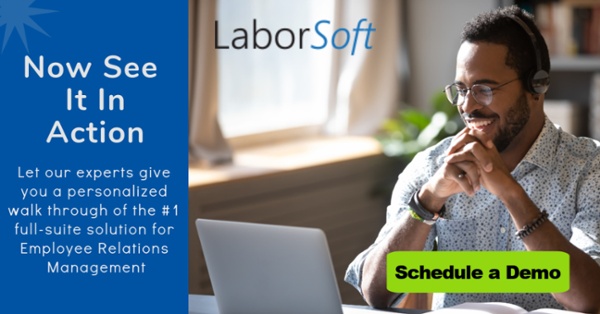Labor Management Software For 5 Common Types of Labor Relations Cases
Read Time 4 mins | Sep 16, 2024 | Written by: Frankie Kourtis

Employers need a labor relations case management tool that gives them the flexibility to handle the many complex types of labor cases they might encounter, each of which can require a unique approach. While there are diverse union-related challenges an employer may encounter, the five types of labor relations cases explored below are the most common.
The National Labor Relations Act (NLRA) is a federal statute that governs the relationships between employers, employees, and labor organizations (i.e. unions). Explore how labor relations software can help employers manage each of these categories of labor cases under the NLRA.
What Are 5 Common Labor Relations Cases?
According to federal labor regulators, the following are five of the most common labor relations cases under federal law:
1. Unfair Labor Practices
The National Labor Relations Board (NLRB) has authority over many alleged unfair labor practices. Among them is the employees’ rights to organize themselves, join a labor union, engage in collective bargaining, and engage in certain other activities related to “mutual aid and protection.” Workers also have the right to refrain from these activities. The statute defines it as an “unfair labor practice” if an employer or a union coerces an employee or interferes with their efforts to participate in protected activities.
When a worker or a union feels that an employer’s actions represent a violation of this rule, it’s helpful to have case management software available to keep procedures and documentation organized and easily accessible.
2. Representation
Labor relations cases in this category relate to perceived issues with union elections and related processes, which are subject to rules established by the NLRA and enforced by the federal government. This includes:
- Elections among employees about whether to join an existing union or form a new one;
- Determinations regarding which employees will be included in a union or bargaining unit; and
- Elections that select representatives to engage in collective bargaining with employers.
An agency known as the Federal Labor Relations Authority (FLRA) deals with representation disputes.
3. Arbitration
Collective bargaining agreements (CBAs) often include provisions requiring arbitration of grievances. When an issue in employer-union relations cannot be easily mutually resolved, it may progress to arbitration facilitated by a neutral third party. Employers and unions have a narrow legal right to appeal arbitration awards, which makes it even more imperative that the case is handled carefully and accurately. Labor management software that centralizes all information and allows for customizable automated reminders about deadlines and procedural steps can be invaluable.
4. Negotiability
Unions may file petitions that challenge the legality of bargaining proposals. In these types of cases, the union may have based its challenge on the NLRA, NLRA regulations, or rulings from an agency like the NLRB or FLRA. A software solution should provide a space to store, reference, and keep track of processes related to these regulations or rulings.
5. Negotiation Impasse
Sometimes, employers and unions cannot reach an agreement despite negotiation among themselves and mediation with a neutral third party. The Federal Service Impasses Panel, which is part of the FLRA, has the authority to resolve disagreements upon the request of either party. The clearer the documentation on the ongoing case, the better the employer will be able to represent themselves at this late stage of employer-union case management.
How Can Labor Management Software Help With These 5 Common Labor Relations Cases?
Labor relations software can help employers streamline the management and organize the documentation of each of these types of cases. LaborSoft’s platform also allows employers to customize each new case to suit the needs of the particular process at hand.
Selection of Case Type
Employers may begin by selecting the type of case from a comprehensive list of pre-set templates. The software customizes the platform based on the most common issues and needs presented by each type of case.
Customization Options
The initial setup performed by the software is only a suggestion. Each user may perform their own customization based on their particular needs. They may add or remove modules and adapt the platform to the specific elements of an individual case, the terms of the CBA at issue, or the employer’s system for handling that type of case.
Tracking and Reporting
The software analytics tools allow users to track data over multiple cases. They may use this data for compliance reporting and internal changes and improvements.
Learn More About What Labor Management Software Can Do for Your Business
Employers need to be prepared for labor disputes, particularly the ones that are most common under statutes like the NLRA. Labor management software provides an all-in-one solution for employers that allows them to manage their labor relations cases efficiently. LaborSoft provides one of the best labor management software systems available.
Contact us today to set up a customized demonstration and learn about how LaborSoft can meet your labor relations system needs.


